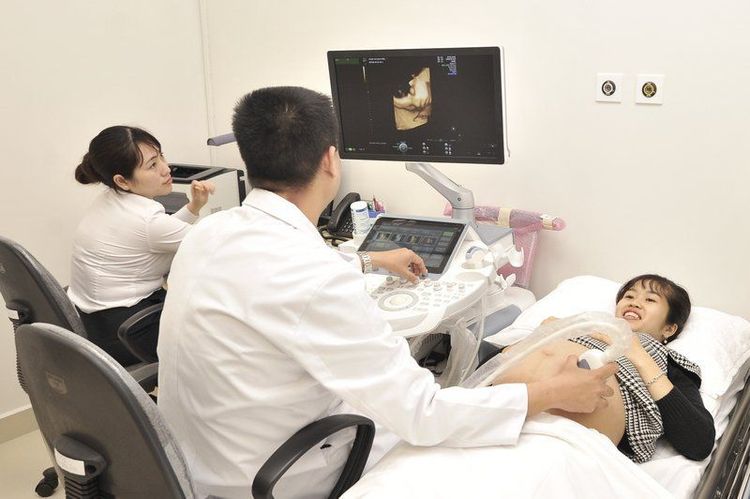This is an automatically translated article.
The following instructions from Dr. BS Nguyen Cong Nghia - Head of Obstetrics and Gynecology Department at Vinmec Times City Hospital will help pregnant women detect and monitor signs so that they can go to the hospital in time.The process of being pregnant for 40 weeks until delivery always carries many potential risks for the mother and the fetus. They can happen suddenly, and change quickly even in mothers who have had previously healthy, low-risk pregnancies.
1. Pregnant women need to go to the hospital immediately if they see the following signs
1.1. Vaginal bleeding Vaginal bleeding at any time during pregnancy requires immediate medical attention. Vaginal bleeding in the early first trimester of pregnancy is common in 15-25% of pregnant women, and can be a sign of threatened miscarriage or ectopic pregnancy. Vaginal bleeding in the late third trimester of pregnancy is even more serious, can be a sign of placental abnormalities, or premature birth. The more blood volume, the more severe the severity.
1.2. Vaginal amniotic fluid discharge Normally, the vagina of a pregnant mother always has a little white discharge (discharge) that is odorless or has no odor due to the increase in hormones during pregnancy. If the pregnant mother notices vaginal discharge that is more than usual, water-like, or massive, continuously oozing, with a slightly fishy and viscous odor; it could be a sign of amniotic fluid leak/premature rupture of membranes/premature rupture of membranes. Cases of amniotic fluid leakage / premature rupture of membranes / premature rupture of membranes are associated with the risk of premature birth, placental prolapse, and especially the risk of infection for the fetus and mother when oozing water / premature rupture of membranes / premature rupture of membranes over 6 hours.
Need to go to the hospital as soon as vaginal amniotic fluid is detected. The doctor will examine, monitor and do tests to make sure there is oozing/premature rupture of membranes/early rupture of membranes, and give appropriate indications depending on the condition of the mother and fetus such as taking antibiotics, monitoring the cause of death. labor or continue to keep the pregnancy.
Trắc nghiệm: Đặc điểm cơn đau đẻ và diễn biến cuộc chuyển dạ
Cơn đau đẻ là dấu hiệu thông báo sự chào đời của em bé. Cùng thử sức với bài trắc nghiệm sau đây sẽ giúp các bà mẹ mang thai nhận biết cơn đau đẻ và diễn biến cuộc chuyển dạ để chuẩn bị trước tâm lý những gì sắp xảy ra đối với mình.The following content is prepared under supervision of Thạc sĩ, Bác sĩ y khoa, Tạ Quốc Bản , Sản phụ khoa , Khoa Sản phụ khoa - Bệnh viện Đa khoa Quốc tế Vinmec Phú Quốc

Vinmec Hospital will provide mothers with this chart, and mothers start counting fetal movements from the 28th week of pregnancy, because the risk is highest due to decreased fetal movement in the last 3 months of pregnancy. If the number of fetal movements is less than 10 within 2 hours, it is a danger sign and requires immediate medical attention.
1.5. Sudden Signs of Pregnancy Any one or more sudden and unusual signs such as fever over 38°C, fainting, shortness of breath, severe headache, chest pain, vomiting, visual disturbances Convulsions and seizures all need to be treated early. Call an ambulance and get to the hospital as soon as possible.

2. Signs that a pregnant woman is not in labor and should not be hospitalized too soon
A mother with a normal pregnancy, without any special risks or instructions from her doctor, needs to know when she is in actual labor and needs to be hospitalized for delivery. Early admission to the hospital without labor actually does not help, on the contrary causes physical fatigue, psychological stress and increases the risk of unnecessary cesarean section for the mother. Ideally, get to the hospital on time.Around the last 3-4 weeks of pregnancy, women often see contractions appear. These contractions are often sudden, not close together, not cyclical or rhythmic. These are Braxton Hicks contractions aka false labor. Contractions are usually mild, often in the anterior abdomen, and may disappear with changing positions or lying down. Until about 2 weeks before delivery, the frequency of contractions will gradually increase and gradually have intervals of 10 to 20 minutes, more clearly seen in pregnant women. Real labor hasn't started yet. The mother will see labor approaching when she feels the fetal position drops down to the lower abdomen (reduction), accompanied by thick and pink vaginal mucus. The most important sign is uterine contractions. The contractions now come in cycles, and get closer and closer together. Contractions usually come from the back and out the front. During the pain, the mother often cannot feel the fetal movement. During pain, the mother is also often unable to speak. When uterine contractions come every 4-5 minutes, and each contraction lasts from 30 seconds to 1 minute, those are signs of real labor and it's time to go to the hospital. If you are not sure if you are in real labor, you should contact the delivery room of Vinmec Hospital for advice. When going to the hospital, the doctor will examine the degree of dilation and dilation of the cervix so that the mother can be admitted to the hospital at the most appropriate time. However, if there are any signs that you need to go to the hospital, you need to go to the hospital right away no matter what time of pregnancy.

Please dial HOTLINE for more information or register for an appointment HERE. Download MyVinmec app to make appointments faster and to manage your bookings easily.














